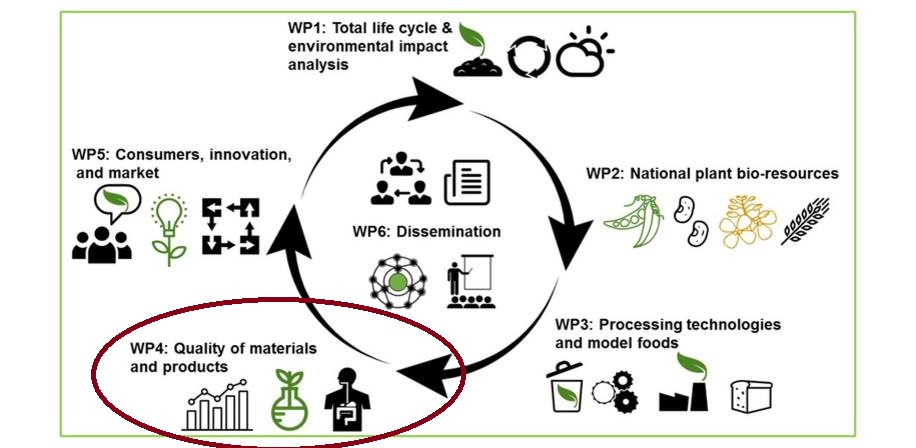Presenting WP4: Quality of raw and processed plant materials and pilot products

This WP will identify both beneficial and anti-nutritional components of selected raw and processed plant and legume materials and food products. The WP will investigate and optimize processes that preserve and improve taste and functional properties, and provide healthy food products for the consumers and a product lines of commercial interest for the food industry.
WP leader professor G.E. Vegarud, NMBU
Nutrient quality
Task leader Tove Devold, NMBU. Gross composition (protein, lipids, carbohydrates, dietary fibre), content of selected beneficial compounds (ess. amino acids and minerals) and anti-nutritional components (protease inhibitors, saponins, FODMAPS, etc) will be identified in selected raw and processed plants and legumes for foods. A special focus will be on protein content, and essential and branched-chain amino acids. The overall positive nutritional value of raw and processed plant sources or ingredients for food products will be selected for further studies.
Functional properties suitable for food applications.
Task leader Kurt Draget, NTNU. Extensive knowledge of processing properties of plant proteins is scarce compared to animal proteins. Such properties are crucial for innovative food products. Water-binding and solubility, viscosity, gelation, emulsification and other essential functional properties will be analyzed. Air classified faba bean protein fraction has been evaluated for functional properties and other raw materials will be tested as a function of extraction/treatment protocol to map the applicability in food applications.

Sensory evaluation. Photo: FPF
Sensory properties
Task Leader Paula Tomasco, Nofima. Sensory characterization of selected raw, processed and food based plant materials, using the trained sensory panel at Nofima, will be performed through descriptive sensory analysis. Approximately 20 (product specific) sensory attributes will be assessed. The information obtained will be used for detailed sensory characterization of plant and legume materials used as food and the sensory information will be related to the consumers’ acceptance or potential rejection (WP5).

In vitro digestion model (Minekus et al., 2014)
Nutrient bioavailability and health effects
Task leader Tor Lea, NMBU. Plant and legume proteins and products will be subjected to gastrointestinal digestion with human digestive enzymes. Interactions with other nutrients affecting their bioavailability will also be studied. In vitro cell models will be used to investigate possible effects on epithelial-, immune cells and inflammation. Products from selected plants will be included in experimental diets and tested for in vivo effects of proteins from different plants and compared with diets containing animal-based proteins. Special emphasis will be on intestinal microbiota composition, intestinal barrier function, nutrient/amino acid sensing pathways and systemic inflammation, a main feature of chronic lifestyle diseases.
Different pilot products produced from peas have been subjected to in vitro digestion, and digestibility has been compared to conventional products. The effect of processing of raw materials and protein fortification has also been studied and will give input to further development of new ingredients and food products in WP3.
Presentation new PhDs:

Tora Asledottir, WP4
I graduated in 2016 with a MSc diploma in Food Science from NMBU. Since then I have been working with food protein digestibility and bioavailability as an engineer within the research group Food and Biological Function at KBM, NMBU. Recently I started my PhD studies on food bioactives within FoodProFuture as a part of WP4. I will be working with nutrient quality of raw plant materials and products with focus on anti-nutritional components present in the food. I will also use in vitro digestion models with human gastrointestinal juices to study the digestibility of different plant proteins in respect to type of processing. Digests from selected plant products will also be tested in cell models to investigate possible effects on epithelial-, immune cells and inflammation. This work will contribute to the knowledge on health effects of raw and processed plant material for further development of new plant-based food products. I am eager to be a part of FoodProFuture and to make a contribution to the sustainable shift in future foods.
